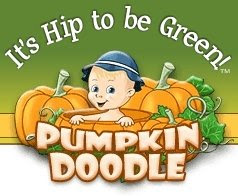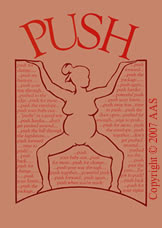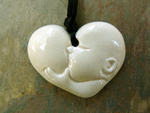Parenting Begins From a Baby's Time in the Womb:
What We Know About Prenatal Memories
Original Japanese edition "Onaka No Nakakara Hajimeru Kososdate"
by Akira Ikegawa, MD, PhD., Ikegawa OB/GYN Clinic Director
Translated by Seika Marie Smith
pages 69-71 with commentary by Baby Keeper!
Love Nourishes a sense of independenceThe most important thing you can do to nurture your child's independence is to give him a strong sense of security, and the best way to do this is by developing a close relationship. There is nothing difficult about the basics of parenting: it simply begins with a hug.
When the mother embraces her child warmly, the child stops needing to cling to her. They feel reassured when they know they are being accepted just the way the are , and will feel confident enough to test their abilities in the outside world if they know they can always return to the security of their mother no matter what happens.
However, if the child had minimal communication with his mother and has no real sense of being protected, all his energies will be devoted to trying to acquire this sense of security, and there will be none left to use in new adventures.
There is new research by Porges, Schore and others (http://www.trauma-pages.org/) looking at the effects of early violence that show us that the earliest environment and parenting create important brain connections. The brains of the non-abused children/adults differ from those who were abused. Their perceptions of the world and what and who they draw into their world will be a reflection of their earliest care. (Odent, Wirth, Nathanielsz, Lipton, Emerson, Castellino).
If your child comes to you, give him a hug. If he feels scared or sad, just give him a hug. I would like to stress how important it is for mothers to remember these basics.
This seems so easy and so simple, doesn't it? The basics -- the simple pleasures of life and parenting get gobbled up the stress of making a living. Who is available to hug most babies and children? Substitute caregivers, beginning with childcare and continuing through childhood? One of the things I loved about homeschooling my daughter and having the summers off with the older ones when they were growing up is having quality time, and LOTS of it. I begrudgingly and sadly relinquished my children over to childcare and kindergarten, BUT, I was in college, thinking of greater days ahead. I was going to be a big deal and change the world! And, I never liked being away from my child for any reason. I had to work with my first child. I was an aide to a clinical psychologist at a VA hospital. It was a great job that didn't require an education but inspired me to one. I took a camping trip when my older son was about five months old -- less than 1/2 hour away. We got the tent set up. Looked around and each other and realized it was a mistake. We dismantled the tent and went home, much to the dismay of Aunt Linda as I was seen as an "overprotective parent" by not letting everyone hold my baby. Breastfeeding moms always hog their babies, you know.
I am still mad to this day that many, many nights were spent with this son, fighting with this Wild Man to get his homework done. So many nights I hated myself for my reactions to our frustration to finish one more stupid paper of math problems. What did they do all day? I learned in homeschooling it takes about two hours a day to accomplish what they do all day at school. Homework in elementary school, after sitting and working all day? Why? Seeds of "work-aholism" -- all of the "isms" for which we have so many treatments? It's torture for a hyperactive child to sit all day and be quiet... or ... does it and going hugless all day create hyperactivity? I feel like our lives were intruded upon and something beyond my control (because I bought into the status quo) robbed us. He spent all day being chastised and challenged to be quiet. Zero hugs for him or any of our children at school when they feel stressed, sad, scared, lonely, or even happy.
Our children spend the majority of their lives with non-parent, non-relative caregivers who are not LEGALLY allowed to hug and touch a child. I am not dis'in' teachers now, but the fact is our children spend their days with people who may or may not even like them, and who certainly don't hold our beliefs and how we want our child treated. And, how could teachers begin to meet the mulitple needs of multiple children? Why do we expect our children to thrive and spend all day without quality attention, touch, eye contact? Activity and things are substituted. Videos, candy, gold stars, and stickers -- tokens meant to "promote self-esteem" but how many hugs a day does any one child get?
Why are American women so happy to relinquish their bodies and their children to the establishment, beginning with birth and continuing through childhood, while we work to "have it all"? In the name of women's rights? Currently there is a resurgence of the political, somewhat feminist led, effort to improve the conditions for working mothers. Moms Rising, supported by Presidential candidate, Barack Obama, is making a lot of news. http://www.momsrising.com/. The Moms Rising campaign does not even mention birth, and so the mother's experience of giving birth, lying down and drugged is not part of the dialog of concerns for women -- even with media blaring about the increased cesarean rates and prematurity and US standing in infant mortality, about school violence, drug addiction, etc.
How a woman gives birth and how this experience affects a woman personally and in relationship to her child is not addressed in the MOMS Rising or in feminist theory. In fact, in the "feminist" efforts that are typically career, work, and child care focused, the concept of mother-baby attachment is attacked. It is done so vehemently by feminist writers attacking the scientific validity and a new dynamic is building -- a battle between natural birthers, stay-at-home, baby-wearing mamas and the professional, career woman who chooses induction or planned cesarean for personal scheduling reasons (CEO's, physicians, movie stars). Their newborn child is more likely to be cared by others beginning very early. These two opposite ends of the spectrum represent a truly small number of women. (Breastfeeding, thankfully, is spanning the spectrum). Many of us fall somewhere in between but we are bombarded with the expectations of the two extremes. No where along the spectrum is THE BABY and the baby's needs seen as primary. "Children our are greatest resource" is a great but hollow sentiment when one looks at what does the human being, a baby, a child, really need from those who bring him or her into the world and then sees how children really are treated.
Many, many, many infants are now in the care of others. Caring, compassionate people, of course, but they are not with a person who loves them. I was pregnant with GI Joe when I began to watch T. Barry Brazelton, MD on a cable show. He was so amazing with the babies -- I saw how present he was with the babies and with the mothers. I saw how present the babies were with him. One day he said something that changed me as a woman -- struggling with being the mother I wanted and to pursue my work as I wanted. I was beginning my MA program in June after my son's March birth. He said one day, that every baby needs to be in the care of someone who is ga-ga in love with that baby. I felt the truth of it in my body.
Truly, only a mother or father or grandparent is ga-ga in love with the baby. You know the love I am talking about -- the feeling of "I am wanna gobble you up" that comes from such intense feelings of connection that you feel you just can't be "one with" enough with the baby. You want to feel them inside you again. I made a choice to have him only with me or his father. I earned my MA in two years, part-time and in the evenings while his father a professional career person also sacrificed to be with him when I wasn't. It requires sacrifices, but what else better is there to sacrifice for? Looking back, which do I regret more -- not being a big-time career woman or not having enough time with my older children? Do I regret the size of my retirement fund or the idea of house payments til I die, or zero world-wide travel at my leisure? Sure, (anything can happen) but how could driving a Beemer instead of Hyundai or a Honda bring more happiness than the smile of my child, feeling my child in my arms and seeing his glowing eyes, or feeling the soft warmth of his cheek pressed against mine? Or watching her perform in her drama, or relay, or recital? Or, the moment etched in my heart -- homeschooling her in second grade and teaching her read, the feeling of this moment watching her read, and we were sitting side by side, each holding a side of the book and her left had resting on my bare leg. "I am teaching my baby to read." What a feeling and moment it was.
I had lunch with a friend who was the custodial parent for his daughter, now in her twenties. He is an accomplished singer and has jammed with many well-known musicians. He said his real pride and accomplishment is in raising her. We were lamenting those years of raising our young children and both feel sadness (and anger) at watching the treatment of children. We both have urges to exclaim to young parents to cherish every moment with your child, because the moment will be gone, never to be returned. Nature always has a way of healing -- parenting mistakes and regrets make for great grandparents, I understand. I have come to believe that women "can have it all, just not at the same time. (or a man who co-parents as a priority). I truly don't know any woman who is happy with her decision to focus on work and attainment of credentials, belongings, and status and at the end of life will wish she's worked more and spent less time with her children.
When a baby starts to learn how to move around by himself, he will only crawl alongside his mom at first. this is the first step to separating form the precious mother and moving independently. Even when he finally begins to walk, he will sometimes check to make sure his mother is in view, and will not stray very far away.
When he's a little bigger and capable of slightly more distance, he will soon come running back to get a hug from time to time. This is his way of affirming his sense of security and making sure he is being watched over.
Please hug your child tightly at these times. Your child may immediately feel reassured and attempt to run off happily again, but instead of releasing him immediately, hold him tightly for a brief moment more, perhaps until our child even has to tell you, "That's enough!" If you release him straight away, your child may think, "Oh, she has already let go," and feel ever so slight disappointed.
Or, I would suggest, possibly much more than "slightly disappointed." In observing a mother-child dyad I can see their attachment dynamic and it is a reflection of the baby's birth and the experience she or he had in coming to the mother from the womb. For example, a woman birthing by cesarean will have her arms tied down. Her baby is taken by strangers and very roughly handled -- to stimulate breathing because the umbilical cord is cut immediately and blood necessary for physiological breathing is left in the placenta. There is much fear in this experience for the baby. Biologically, the impulse and need is to be with the mother. The struggle for intimacy has begun. The choreography is in place. Their experience can be observed in day to day life.
This child may toddle over to the mother as if to need her and then as mother does or tries to reach to him, he jerks away, falls down, cries, and/or moves away. Or, if she doesn't respond and this makes baby push harder, or hit her. Does this relationship just magically begin in toddlerhood? No, that is unreasonable and illogical. The conception and gestation periods, and come together with the process of labor and birth to create a template. As early as the first hours of life, the baby may not be able to respond to the mother in the way her heart and head expect, and nor can she because of pain and drugs, disappointment and guilt. The newborn and mother who were separated begin to "act out" their experience and perceptions over and over until it becomes an unconscious dance.
When the child is experiencing something fearful or that triggers that early, preverbal memory -- going with a stranger, being left by the mother -- the baby reaches for the mother, but can't connect and can't say, "This FEELS just like ....". The mother may want to connect with her child, but other emotions arise (trauma emotions) and she can not physically respond the way her head wants to. She needs to go to work. She doesn't connect and say goodbye with her WHOLE heart. She does so with a broken, wounded heart. These cycle into repeating experiences of "come here, go away" dynamics. So, the "fussy" or "crying" or "belligerent" two year old who is scared may come to the mother and attempt to connect. He may refuse to look at her, say goodbye or to come to her. He may wail at her from across the room, or lash out at her. WE are taught in traditional medical and psychological training that these are not abnormal, even though our maternal feelings say otherwise.
The toddler is the child, the non-neocortex thinker and is expected to understand and respond. Meanwhile, the adult mother is wrought with emotion she tends to stuff, hide, and deny -- mostly to herself. The child behaves in the best way a two year knows how to do, based on his collective earlier experiences. A mother, the adult, does not understand why this is happening to her and her baby. Those in the business of caring for children don't know and rarely ever attribute it to early attachment issues. Feminists abhor it. Women refuse to believe that the epidural or csection had anything to do with it --- especially if she chose it for her reasons and needs. Her rights. She is also "in her stuff" and frustrations of daily life will respond out of stress in REACTION to the child's behavior. This triggers further emotions from the child. This is their dance. Later in life, we find "partners" who know our dance routine -- even if it feels miserable and our neocortex thinking brain wants the social model.
Eventually, every child will leave home of their own free will. Your children are only under your care for a brief and limited time in life. In a way, "parenting" can be summed up as the gradual process for a mother and child that have become very close.
For a mother in the throes of parenting, the days go by in a blur of rushed activity. There are no doubt many times when she wishes with a sigh that her children would grow up quickly and be able to take care of themselves. However, it is inevitable that children will leave home one day, and when that happens there will be no reverting to those former days spent inseparable with their mother.
Being able to press your cheek against the tender softness of your baby's is a special privilege reserved just for the parents/moms. No matter how hard parenting can seem at times, there will no doubt come a day when you nostalgically reflect upon this period as one of the best of your life. Enjoy and savor this precious time while it lasts.
Oh, mamas, am I here to tell you how true that is. One of my most joyful sensate experiences is to hug one of my children, and cheek to cheek to breathe in the smell of him or her. Oh, mama --- the last time I saw and hugged my GI Joe before he went off to officer training (expecting to see him before he deployed, but sadly, did not), we had that moment that the author speaks of. Hold him tightly for maybe one more brief moment or even until he says enough. I held him until he let go with one more breathe of taking him in and making eye contact with him before separation. THIS is SO what every mother and baby need at birth -- to feel and smell each other and to make eye contact before ANYONE interrupts them.
There is more to a close relationship than just physical hugging. Mothers need to hug their children with their whole heart.
Their WHOLE heart ... and, I wonder, how can a woman freely do that when her own heart has been broken -- by her own mother-daughter relationship, by a less than whole childhood, by wounding of her body and soul in birthing the baby. Our society has a responsibility to honor the HEART of a woman and honor that women are Life Givers, and that to believe and honor that is zero being anti-women's rights or anti-feminist. It is a woman who builds the baby and from whom whose body the baby comes -- that is nature and the way it is. To honor that as perhaps one of the most important contributions she makes zero negates her as a chemist, lawyer, engineer, nurse, teacher, artist, or cook or whatever she might do in the world. Life-giver, nurturer, professional, breadwinner, etc -- these are the parts of the self, part of her WHOLE that only she can connect. To do so, she needs safety, support, nurturance as a woman and a mother -- from her society.
It takes practice to be able to listen attentively to what your child wants to say. Small children don't have a big enough vocabulary, and may find it hard to adequately express themselves. Don't interrupt him or rush to finish his sentences for him, but take the time to listen carefully and embrace him with your heart.
THIS, is one of the key elements of prenatal and birth healing where a primary goal is to heal the breaks in the attachment process at birth.
page 69-71
This booklet is available from Sunmark Publishing, Inc., 2-16-11, Takadanobaba, Shinjuku-ku, Tokyo, 169-0075 Japan. Tel: 81-3-5272-3157, fax: 81-3-5272-3117. Email: rights@sunmark.co.jp. http://wwww.sunmark.cojp/eng/








1 comment:
Wow
What an interesting subject!
Post a Comment